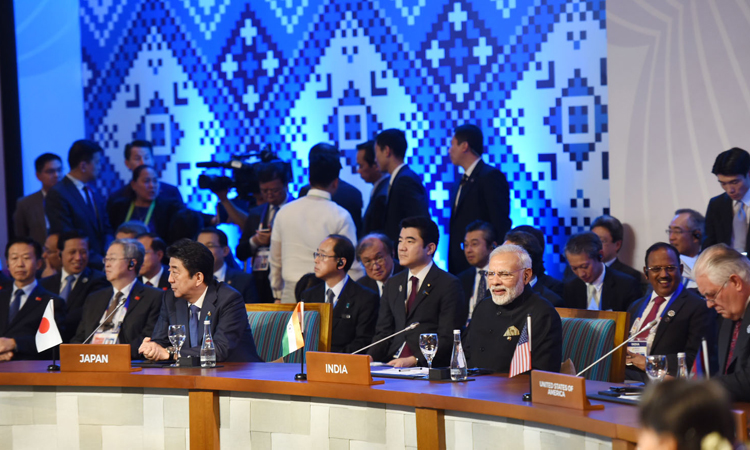INDIAN ARMED FORCES CHIEFS ON
OUR RELENTLESS AND FOCUSED PUBLISHING EFFORTS

SP Guide Publications puts forth a well compiled articulation of issues, pursuits and accomplishments of the Indian Army, over the years

I am confident that SP Guide Publications would continue to inform, inspire and influence.

My compliments to SP Guide Publications for informative and credible reportage on contemporary aerospace issues over the past six decades.
India hosts trilateral talks with Japan and Australia

Aiming at countering the expanding Chinese Naval power in the Indian Ocean and its belligerent behavior in the South East Asian waters, India in December held secretary level talks with Japan and Australia to discuss the existing challenges coming from China and developing a strategy to ensure a rule based order in the Indo-Pacific.
Towards this effect, India and Australia held their first '2+2' Foreign Secretaries and Defence Secretaries dialogue with Australia and India-Australia-Japan Trilateral Dialogue in Delhi.
On December 12, Foreign Secretary S. Jaishankar and Defence Secretary Sanjay Mitra and their Australian counterparts, Secretary of Department of Foreign Affairs and Trade Frances Adamson, and Secretary of Department of Defence Greg Moriarty reviewed all aspects of bilateral relations with a focus on strategic and defence relations.
"India and Australia share warm bilateral relations based on shared democratic values and pluralism. There is a growing convergence of strategic perspectives between the two countries," Ministry of External affairs, said in a statement.
"Both sides agreed that a free, open, prosperous and inclusive Indo-Pacific region serves the long-term interests of all countries in the region and of the world at large," it added.
The idea for the '2+2' talks was first discussed during the summit level talks between India and Australia in 2014.
Again on December 13, Jaishankar hosted the 4th India-Australia-Japan Trilateral Dialogue with Adamson and Vice Minister of Foreign Affairs of Japan Shinsuke Sugiyama, in New Delhi.
Highlighting the growing convergence of their interest in the Indo-Pacific region, three countries underscored their support for ASEAN (Association of Southeast Asian Nations) centrality in the political and security architecture of the Indo-Pacific region.
"The three sides stressed the need for greater collaboration on maritime security and domain awareness and disaster response capabilities. They also renewed their resolve to fight the scourge of terrorism in all its forms and manifestations and stressed the need for enhanced cooperation on counterterrorism," India said in a statement.
Japan proposed to host the next round of the dialogue in Tokyo.
India-Australia during the visit of Prime Minister of Australia Malcolm Turnbull to India, in April this year, had underscored "commitment to enhancing regional cooperation in promoting maritime safety and security."
Giving the operational outlook of India, Navy Chief Admiral Sunil Lanba, during his annual press conference on December 1, had said, "We now have a bound presence of a ship deployed in the Andaman Sea and the mouth of the Malacca strait. We have ships on deployment in the Gulf of Oman and the Persian Gulf and the North Arabian Sea, the North Bay of Bengal and the strategically important straits of Lombok and Sunda."
These meetings are continuation of the dialogue started during first ever quadrilateral meeting of India, United States, Japan and Australia held on the sideline of the ASEAN summit. The meeting was one of the first steps towards building a strategic relationship between the nations focused at keeping the East Asian waters free for navigations.
Indian naval presence in the South China Sea and regular port calls at Japan and Australia is proof that India is moving resolutely towards a well thought out maritime strategy in the Indo-Pacific. The series of talks are beginning of the execution of the strategic commitment.





